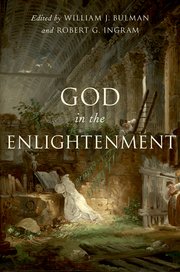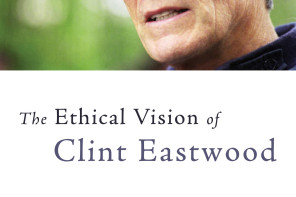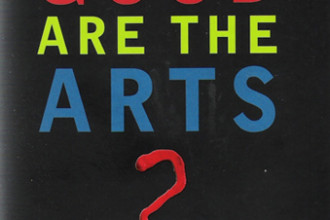God in the Enlightenment, ed. William J. Bulman and Robert G. Ingram, (Oxford, Oxford University Press, 2016) pp. 322. £22.99/$34.95
In the wake of a seemingly resurgent right wing populism, a concerning rise of virulent xenophobia and islamophobia, the question of the place of the religious in the liberal democracy has once again become pressing. As Bulman and Ingram point out in their introduction to God in the Enlightenment, the epoch of this question has been from at least 1979, with the Iranian Revolution. The ostensible secularity of modernity has been shattered by the forceful reappearance of national and international religious movements and events. Given the trauma and religious fervour of twentieth-century history (whether that be the liberation theologies of Latin America or the new God of American capitalist imperialism) a familiar call rings out again — we must “return to Enlightenment values.”
 The “Enlightenment project”, no matter how disparaged by some academic circles, ‘still serves as a cornerstone of liberal self-understanding and antiliberal and anti-secularist critique.’ (2) However, as the editor’s introduction makes plain, recent scholarship has complicated the dichotomy of the Enlightenment as either the birth of modern liberal, secular democracy or the great defeat of public religion. (Perhaps this might be framed as the conflict between the secular and historical Enlightenment vs. the religious, conservative, theological past.)
The “Enlightenment project”, no matter how disparaged by some academic circles, ‘still serves as a cornerstone of liberal self-understanding and antiliberal and anti-secularist critique.’ (2) However, as the editor’s introduction makes plain, recent scholarship has complicated the dichotomy of the Enlightenment as either the birth of modern liberal, secular democracy or the great defeat of public religion. (Perhaps this might be framed as the conflict between the secular and historical Enlightenment vs. the religious, conservative, theological past.)
Perhaps this dichotomy can be moved beyond – it would seem essential to escape the false dilemma that is ‘the need to either defend or condemn philosophically articulated secular liberalism.’ (14) What if, ask the editors, ‘the Enlightenment, that herald of modernity, was never secularist, rationalist or liberal in the first place?’ (3) Whilst such a question would (to put things mildly) hardly be a surprise to postcolonial philosophers, critical race theorists or more Marxist thinkers, at least the question is being asked at all rather than completely neglected for the sake of ideological convenience.
The volume presented aims to contribute to the project of constructing a more compelling, ‘less ideologically loaded’ (4) view of the Enlightenment. Neglecting for a moment the supremely ideologically loaded disavowal of ideology, the attempt to embrace the idea of Enlightenments, rather than a single Enlightenment, is one to be applauded. The task is to do justice to both the liberal, secular and philosophical Enlightenments as well as the religious and authoritarian aspects to it.
Justin Champion’s essay “Godless Politics, Hobbes and the Public Religion” articulates the wider issues that the volume seeks to grapple with very clearly. He begins by pointing out the persistence of one of the central tenets of Enlightenment thinking – that ‘political authority derived from nonreligious sources and trumped theological claims. (42) Yet, even today, ‘the demands of contemporary believers to conspicuously express their faith threatens the integrity of the secular sphere.’ (43) It is usually through a Lockean liberalism that the Enlightenment is defended but this same, Locke-inspired philosophy ‘reinforced the ethical value and status of revealed doctrine.’ (43)
In contrast, Champion seeks to recuperate the work of Thomas Hobbes, seeing in his work rather than Locke’s a way by which the divine is ‘neutered’ as a source for political and moral authority. Through Champion’s careful reading of the ways in which Hobbes sought to reconcile religious authority with the functions of the state as well as his reception by thinkers like Rousseau, Hobbes arguably moves from being marginal to the Enlightenment to become one of its first heralds. In short, whilst Hobbes ‘recognized the significance of claims to religious truth for establishing civil peace’ (58), he also denied any transcendence to these claims.
Other stand out essays include Anthony Matysin’s fascinating exploration of French Religious Apologetics, as well as essays from Joan-Pau Rubies on engagements with Hinduism and Claudia Brosseder’s work on colonial Peru. Given the politically loaded nature of the term “enlightenment”, it is heartily encouraging to see contributions that broaden the scale of the debate away from white, Western European thought and history.
Jonathan Sheehan’s excellent contribution, entitled “Suffering Job: Christianity Beyond Metaphysics,” explores the book of Job and some of its ‘eighteenth century afterlives,’ (p. 183) showing the ways in which speculations about God ‘were conducted most vigorously outside the authoritative frameworks of the Christian church.’ (183) The conclusion from Dale K. Van Kley, “The Varieties of Enlightened Experience”, ties together many of the broader themes that have preoccupied the volume’s contributors, drawing on the cultural and historical record as well as the wider academic material.
Thanks to the influence of post-structuralist thinkers such as Derrida and Foucault (the regular bogeymen of a certain strand of American academia) ‘the loss of confidence in the capacity of language to engage “reality” may spell the end of the concept of Enlightenment.’ (p. 288)
But despite such an end the response is not necessarily elegiac – it raises the possibility of reconsidering eighteenth-century ‘religious phenomena in something other than self-validating “enlightened” categories’ (p. 288) – a challenge taken up by Charles Taylor and Alisdair McIntyre among others.
Thus, we must consider the period as a series of enlightenments that have become more porous to religion than the simple monolithic Enlightenment. Such a move is not uncontroversial, as Jonathan Israel’s megavolumes of Enlightenment Contested amply prove. Still, across this lively and critically engaged collection, the period of history too often abstracted down into the concept of Enlightenment emerges in fresh and unexpected ways, as the wide range of scholars all prove in a variety of ways that ‘God survived the Enlightenment…but he did not survive in unaltered form.’ (p. 310)





